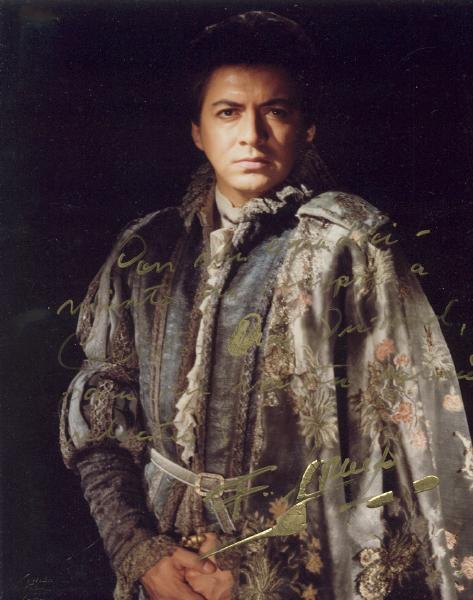Although he was the son of a musicologist and organist, his voice was only discovered in the university choir when he studied
business economics, so he took singing lessons and made his debut in 1969 in his native city with a Schumann recital. He went
on both as a concert tenor and at the university, graduating in business economics in 1972.
In 1973, he made his operatic debut, again in Mexico City; his first roles were Massenet's des Grieux, and Rodolfo. In 1974, he
got an engagement in Karlsruhe, while further studying voice in Munich. Guest appearances in Brussels, Luxembourg,
Düsseldorf, Stuttgart, Zürich, Nürnberg or Aix-en-Provence led to contracts in both Zürich and Munich in
1978; the same year, he was Steuermann at the Bayreuth Festival. From 1981, he sang frequently at the Salzburg Festival, and
soon made a world career: Paris Opéra, Metropolitan Opera, La Scala, Vienna Staatsoper, Tokyo, Chicago, Berlin
Staatsoper, Barcelona, Madrid, Venice... you name it.
He specialized originally in Rossini and Mozart; at that time, he seemed like a smart and likeable guy (and his language skills
were absolutely impressive; for instance, he spoke German almost like a native). He was, at that time, an incredibly boring
interpreter (and actor), but for people who don't abhor a caprino as much as I do, he was satisfying in terms of vocality and
musical style, and his coloratura was acceptable.
By the mid-1980s, he started singing slightly heavier roles: Gounod's Faust, or Alfredo for instance. With his repertory, also
his personality changed considerably: all of a sudden, he had become a fierce stage actor, and I'll never forget the interview
where he stated that he was the only tenor able to sing "Libiamo, libiamo", perhaps with the exception of Alfredo Kraus, who was though (as per Araiza) lacking the required heft in the top register. As far as I am
concerned, that was just about the story of Francisco Araiza; very soon, his caprino seemed to strangulate him while singing,
the voice became terribly unsteady, and the top register (which had of course always been ten times more lyrical than Kraus')
very shaky.
However, he went on unperturbedly and unabashedly, eventually even singing Lohengrin (Venice, 1990), Stolzing (Met, 1993),
Siegmund, Parsifal, Don Alvaro (Zürich, 1991) or Andrea Chénier. From the late 1990s, he decided his model caprino
needed to be passed on to future generations, and worked as a voice teacher (notably at the Stuttgart University of Music).
Reference 1: Kutsch & Riemens, reference
2
